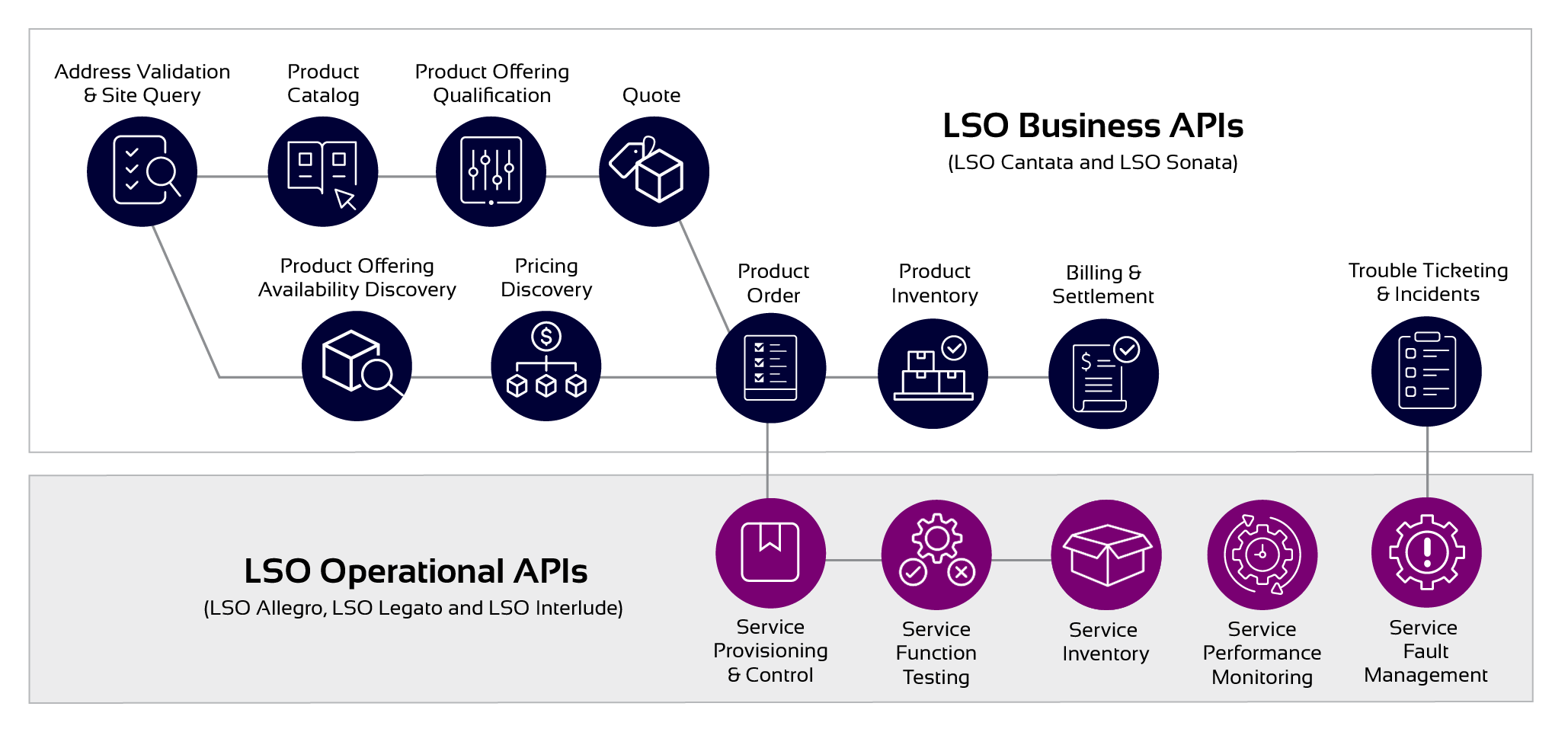Within the LSO Framework, LSO Sonata APIs address the business layer of business interactions between service providers for delivered MEF standard services, like quoting, ordering, and product inventory. They support end-to-end automation and orchestration of digital services at the LSO Sonata Interface Reference Point in the LSO Reference Architecture.
LSO Sonata APIs combine product-agnostic business API functionalities with product payloads (data schema). For example, MEF 3.0 Carrier Ethernet services can be orchestrated using LSO Sonata and LSO Cantata APIs for full end-to-end service automation at the business layer of Carrier Ethernet services across multiple providers within a supply chain. This combination drastically accelerates an enterprise’s ability to access off-net business locations with robust, dynamic digital services, including connectivity and cybersecurity.
The related LSO Sonata SDK and standards themselves apply to a wide range of products and services.
See MEF’s Technical Standards & Educational Materials for LSO Sonata

Either standalone, or together with LSO Cantata APIs, LSO Sonata automates digital services end-to-end—from the subscriber through to the service provider and any partner operators.
LSO Sonata APIs support business automation of a wide range of MEF and non-MEF services, thus empowering the service provider with frictionless access to wholesale digital services.
MEF LSO Sonata APIs – Frequently Asked Questions — 2021 Nov
Product Portfolio: LSO Sonata
MEF LSO Sonata APIs – Frequently Asked Questions
The Case for Standardized and Automated Inter-Provider Business Interface — 2020 Feb
Also See: Business and Operational Aspects of Implementing LSO Sonata
Product Portfolio: LSO Sonata, Carrier Ethernet
This paper is aimed at those decision makers within ICT-SPs (Information and Communications Technologies Service Providers including traditional telcos, MSOs, MNOs, cloud operators and other entities involved in wholesale supply of data services) and their wholesale data services partners that are discussing adoption of standardized and automated inter-provider business interfaces.
Business and Operational Aspects of Implementing LSO Sonata — 2020 Feb
Also See: The Case for Standardized and Automated Inter-Provider Business Interface
Product Portfolio: LSO Sonata, Carrier Ethernet
This White Paper is aimed at service providers that have made a decision to create a standardized zero-touch/automated inter-provider commercial and business interface based on MEF’s extensive LSO Sonata APIs and underlying standards.
MEF 3.0 Workshop – Inter-Provider Automation – LSO Sonata Roadmap & Use Cases — 2019 Nov
Product Portfolio: LSO Sonata
LSO Sonata is the corner-stone effort of inter-provider service automation, enabling service provider partners to use automation to manage their service-oriented business functions, from serviceability to order. Initial service automation is focused on MEF 3.0 Carrier Ethernet services, delivering increased business velocity for the service provider and its enterprise customers.
MEF 3.0 Workshop – MEF 3.0 LSO Sonata Certification — 2019 Nov
Product Portfolio: LSO Sonata
MEF LSO Sonata Certification will enable the verification and resulting business velocity to inter-provider service automation by establishing and validating adherence to the LSO Sonata API standards.
LSO Framework Release ‘Grace’ — 2023 Dec
Product Portfolio: LSO Cantata, LSO Allegro, LSO Sonata, LSO Legato, LSO Presto, LSO Interlude
This release advances the Business Requirements and APIs for Product Catalog, Product Offering Availability and Pricing Discovery, Performance Monitoring and Streaming Management.
LSO Framework Release ‘Fergie’ — 2023 Jun
Product Portfolio: LSO Cantata, LSO Allegro, LSO Sonata, LSO Legato, LSO Presto, LSO Interlude
The theme of this release is the complete Business APIs Suite (by adding Product Catalog and Product Offering Availability and Pricing Discovery APIs). It also enriches the Operational API Suite by adding Performance Monitoring and Passive Statistics and Streaming Management.
LSO Framework Release ‘Ella’ — 2023 Jan
Product Portfolio: LSO Cantata, LSO Sonata, LSO Legato, LSO Presto
The theme of this release is the Introduction of LSO Operational APIs and it also introduces the Billing API. Three APIs and Developer Guides: Product Order Management, Trouble Ticketing, and LSO API Security Profile are now finalized standards, and six additional are in Letter Ballot.
LSO Framework Release ‘Dolly’ — 2022 Jun
Product Portfolio: LSO Cantata, LSO Sonata, LSO Legato, LSO Presto
The theme of this release is Internet Access and adds APIs for Appointment and Work Order. 5 APIs and Developer Guides: Address, Site, POQ, Quote, and Inventory are now finalized standards.
LSO Framework Release ‘Celine’ — 2022 Jan
Product Portfolio: LSO Legato, LSO Sonata, LSO Presto
The theme of this release is Ordering and Inventory: it delivers full coverage of Business Requirements, API and API Developer Guides for Ordering and Inventory API functions. NOTE: Some parts of the release are for MEF Members only.
LSO Framework Release ‘Billie’ — 2021 Jun
Product Portfolio: LSO Sonata, LSO Legato, LSO Presto
The theme of this release is Ordering and Inventory: it delivers full coverage of Business Requirements, API and API Developer Guides for Ordering and Inventory API functions. NOTE: Some parts of the release are for MEF Members only.
MEF 139 LSO Sonata Internet Access Product Schemas and Developer Guide — 2024 Jan
Product Portfolio: LSO Sonata
Tags: LSO Sonata
The MEF Standard consisting of this schema guide and its associated software artifacts (JSON Schemas) defines and describes the product-specific information used in LSO Cantata and LSO Sonata APIs for a set of Business Functions - specifically, Product Offering Qualification, Quote, Product Ordering, and Product Inventory - for Basic and Advanced Internet Access product.
Amends: MEF 125
Product Portfolio: LSO Cantata, Subscriber Carrier Ethernet, LSO Sonata
Tags: LSO Sonata, LSO Cantata
This document is an Amendment to MEF 125 LSO Cantata and LSO Sonata - Subscriber Ethernet Product Schemas and Developer Guide.
MEF 141 LSO Cantata and LSO Sonata Billing Management API – Developer Guide — 2023 Oct
Product Portfolio: LSO Cantata, LSO Sonata
This standard is intended to assist implementation of the Billing functionality defined for the LSO Cantata and LSO Sonata Interface Reference Points (IRPs).
MEF 123 LSO Cantata and LSO Sonata Product Order Management API – Developer Guide — 2023 Feb
Product Portfolio: LSO Cantata, LSO Sonata
Tags: LSO Sonata, LSO Cantata
This standard is intended to assist the implementation of the Product Order functionality defined for the LSO Cantata and LSO Sonata Interface Reference Points (IRPs).
MEF 127 Product Catalog Requirements and Use Cases — 2024 Apr
Product Portfolio: LSO Cantata, LSO Sonata
This document identifies the common Use Cases and attributes needed to support the Product Catalog at the LSO Sonata/Cantata Interface Reference Point.
Product Portfolio: LSO Sonata
This document contains the Business Requirements and Use Cases for Product Offering Availability and Pricing Discovery between a Seller and a Buyer at the Sonata/Cantata Interface Reference Point.
MEF 124 LSO Cantata and LSO Sonata Trouble Ticket and Incident Management API – Developer Guide — 2023 Feb
Product Portfolio: LSO Cantata, LSO Sonata
Tags: LSO Cantata, LSO Sonata
This standard is intended to assist implementation of the Trouble Ticketing functionality defined for the LSO Cantata and LSO Sonata Interface Reference Points (IRPs).
MEF 137 LSO Cantata and LSO Sonata Appointment and Work Order Management API – Developer Guide — 2023 Feb
Product Portfolio: LSO Cantata, LSO Sonata
Tags: LSO Sonata, LSO Cantata
This standard is intended to assist implementation of the Appointment functionality defined for the LSO Cantata and LSO Sonata Interface Reference Points (IRPs).
MEF 106 LSO Sonata Access E-Line Product Schemas and Developer Guide — 2023 Feb
Product Portfolio: LSO Sonata, Operator Carrier Ethernet
Tags: LSO Sonata
The MEF Standard consisting of this schema guide and its associated software artifacts (JSON Schemas) defines and describes the product-specific information used in LSO Sonata APIs for a set of Business Functions—specifically, Product Offering Qualification, Quoting, Ordering and Inventory—for an Access E-Line product.
MEF 125 LSO Cantata and LSO Sonata Subscriber Ethernet Product Schemas and Developer Guide — 2023 Feb
Product Portfolio: LSO Cantata, LSO Sonata, Subscriber Carrier Ethernet
Tags: LSO Sonata, LSO Cantata
The MEF Standard consisting of this schema guide and its associated software artifacts (JSON Schemas) defines and describes the product-specific information used in LSO Cantata and LSO Sonata APIs for a set of Business Functions – specifically, Product Offering Qualification, Quote, Order and Inventory, for Subscriber Ethernet Services conforming to MEF 6.3.
MEF 57.2 Product Order Management Business Requirements and Use Cases — 2022 Oct
Product Portfolio: LSO Cantata, LSO Sonata
Tags: LSO Cantata, LSO Sonata
This standard identifies the common Product Order Use Cases and attributes needed to support inter-carrier Product Order management.
MEF 134 Billing and Invoice Business Requirements and Use Cases — 2023 Feb
Product Portfolio: LSO Sonata
Tags: LSO Sonata
This document contains the Business Requirements and Use Cases for Invoicing between a Seller and a Buyer at the Sonata Interface Reference Point.
MEF 122 LSO Cantata and LSO Sonata Site Management API – Developer Guide — 2022 May
Product Portfolio: LSO Cantata, LSO Sonata
Tags: LSO Cantata, LSO Sonata
This standard is intended to assist the implementation of the Site Retrieval functionality defined for the LSO Cantata and LSO Sonata Interface Reference Points (IRPs).
MEF 121 LSO Cantata and LSO Sonata Address Management API – Developer Guide — 2022 May
Product Portfolio: LSO Cantata, LSO Sonata
Tags: LSO Sonata, LSO Cantata
This standard is intended to assist implementation of the Address Validation functionality defined for the LSO Cantata and LSO Sonata Interface Reference Point (IRPs)
MEF 116 LSO Cantata and LSO Sonata Product Inventory API – Developer Guide — 2022 May
Product Portfolio: LSO Cantata, LSO Sonata
Tags: LSO Cantata, LSO Sonata
This standard assists the implementation of the Product Inventory functionality defined for the LSO Cantata and LSO Sonata Interface Reference Points (IRPs)
MEF 115 LSO Cantata and LSO Sonata Quote Management API – Developer Guide — 2022 May
Product Portfolio: LSO Cantata, LSO Sonata
Tags: LSO Sonata, LSO Cantata
This standard is intended to assist the implementation of the Quote functionality defined for the LSO Cantata and LSO Sonata Interface Reference Points (IRPs)
MEF 80 Quote Management – Requirements and Use Cases — 2021 Jul
Product Portfolio: LSO Sonata
This specification identifies the common Quote Use Cases and attributes needed to support intercarrier Quote management.
I want to investigate further. See all LSO Sonata resources:
Major service providers have implemented LSO Sonata to automate ordering MEF 3.0 Carrier Ethernet Access E-Line services. The LSO Sonata SDK is continually evolving and expanding to include all aspects of business-to-business interaction between providers for service automation. As a MEF member, you can help lead the market in adopting service automation. Find the current project work in the MEF 3.0 LSO Sonata Hub on the MEF Members’ Wiki.
All employees of active MEF-member companies are authorized to access MEF Members’ Wiki. Don’t have a login? Register. Not a member? Join MEF. Not sure? Contact Us.
Go to the Member Wiki